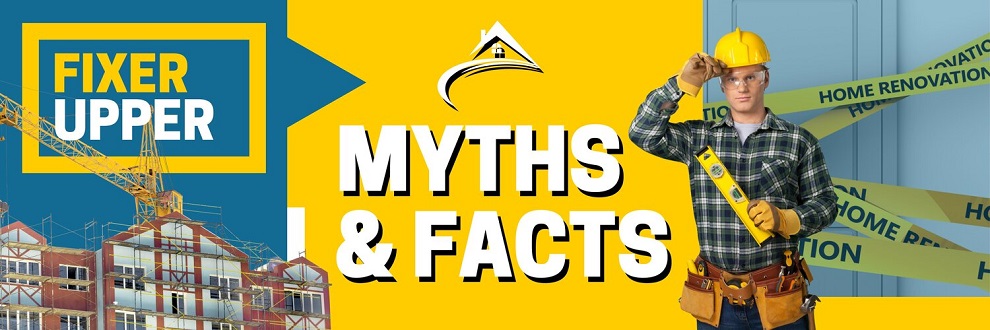🛠️🏠 Fixer Upper Exposed: 🧐🗝️ Myths & Facts in Toronto Real Estate Crucial Pre-Buying Insights! 💡🎉 

Before You Buy: Understanding the Truth About Fixer Uppers in Toronto Real Estate!
Before you Buy that Renovation project, arm yourself with essential knowledge.
You can receive FREE priority access to All Fixer-Upper TRREB Listings from all Real Estate companies! Specify your Desired Area in the Sign Up Form.
Before deciding that your next home must be a fixer upper… you should do some homework on the subject. Many prospective homebuyers tend to have a romanticized version of the entire process, and are quite shocked when confronted with the hard reality.
Fixer Upper homes can represent a great opportunity to purchase a home for less… as long as you thoroughly research the facts, and run the financial numbers BEFORE you purchase.
To help homebuyers who may be wondering whether or not a fixer upper even suits their present personal and financial needs, industry experts have prepared a FREE Special Report entitled, “Fixer Uppers: Myths & Facts – What You Should Know Before You Buy”. This report dispels the 5 most commonly held myths surrounding fixer upper properties, and also provides a simple financial formula for estimating available profit, or savings.
To order this FREE Special Report NOW, simply use the form on this page to send your request.
Fixer uppers and handyman specials often represent a good way to get a great deal on a home. As long as you are aware that these homes need work, are prepared to create a realistic budget ahead of time, and remember to leave yourself some financial "wiggle room", you can have an ideal home for much less than what comparable homes (already in top condition) are selling for.
Here's how it works: You will receive a FREE report listing the best "fixer uppers" on the market (including photos) in your desired price range and location. There is no cost for this information, and absolutely no obligation. This insider information, sent to you in an incredibly simple and efficient format, will give you a huge advantage over other buyers in the marketplace.
If you are the type of person who recognizes a "diamond in the rough" and know a great deal when you see one, request this free "Fixer Upper Hotlist" by filling out your criteria on this page.
What are some common myths associated with buying a Fixer-Upper property in Toronto?
- Myth: Fixer-uppers are always cheaper:
While it's true that fixer-uppers are generally priced lower than move-in-ready homes, the cost of renovations and repairs can quickly add up. It's essential to thoroughly assess the property's condition and estimate the potential renovation costs before assuming it will be a more affordable option. - Myth: Renovations always increase the property's value:
While renovations can add value to a home, it's not a guarantee that you will recoup the full amount spent on renovations. Market conditions, location, and the type of renovations performed all play a role in determining the return on investment. It's important to research the local real estate market and consult with professionals to ensure your renovation plans align with market demand. - Myth: You must have extensive DIY skills:
Taking on a fixer-upper doesn't mean you need to be a construction expert. While some DIY skills can come in handy, you can also hire professionals for various renovation tasks. It's crucial to have a realistic understanding of your abilities and budget for professional help when needed. - Myth: Renovations can be completed quickly and easily:
Renovating a fixer-upper is a time-consuming process that requires careful planning and coordination. Unforeseen issues can arise during the renovation, causing delays and additional expenses. It's important to have a realistic timeline and budget in mind and be prepared for unexpected challenges. - Myth: Financing a fixer-upper is difficult:
While it can be more challenging to secure financing for a fixer-upper compared to a move-in-ready home, there are options available. Renovation loans, such as the Purchase Plus Improvement Mortgage, can provide the necessary funds for both the purchase and renovation costs. Working with a knowledgeable mortgage professional can help you explore the financing options suitable for your situation.
What are the Key Factors to consider before Purchasing a Fixer-Upper Property in Toronto?
- Budget: Determine your budget for purchasing the property and the estimated renovation costs. Consider all potential expenses, including materials, labor, permits, and any unexpected repairs that may arise during the renovation process.
- Property condition: Thoroughly assess the condition of the property. Look for structural issues, water damage, electrical and plumbing systems, and any other significant repairs that may be required. It's important to have a clear understanding of the property's condition and the extent of the renovations needed.
- Location: Consider the location of the property and its potential for future appreciation. Look at the neighborhood's amenities, proximity to schools, transportation, and other factors that may impact the property's value and desirability.
- Renovation scope and feasibility: Determine the scope of renovations you are willing to undertake and the feasibility of those renovations. Consider your skills, available time, and resources. It may be helpful to consult with contractors or renovation professionals to get a better understanding of what is achievable within your budget and timeline.
- Market conditions: Research the real estate market in the specific area where the property is located. Understand the current market trends, recent sales prices of similar properties, and the demand for renovated homes in the area. This information will help you determine if the investment is likely to provide a good return.
- Financing options: Explore different financing options available for purchasing and renovating a fixer-upper property. Traditional mortgage loans may have limitations for properties in need of extensive renovations. Consider renovation loans or other specialized financing options that cater to fixer-upper properties.
- Time and commitment: Be prepared for the time and commitment required to complete the renovations. Renovating a fixer-upper property can be a lengthy and challenging process. Ensure you have the time, resources, and patience to oversee the renovations or hire professionals to manage the project.
What Renovations or repairs are typically needed when Buying a Fixer-Upper Property?
- Structural repairs: This includes addressing any issues with the foundation, roof, walls, or floors. Structural integrity is crucial for the safety and longevity of the property.
- Plumbing and electrical systems: Upgrading outdated plumbing and electrical systems is often necessary. This may involve replacing pipes, rewiring, installing new fixtures, and ensuring compliance with building codes.
- Kitchen and bathroom updates: Renovating the kitchen and bathrooms can significantly enhance the property's value and appeal. This may involve installing new cabinets, countertops, appliances, sinks, faucets, and fixtures.
- Flooring: Upgrading or replacing flooring is a common renovation in fixer-upper properties. This can include installing hardwood, laminate, tile, or carpet, depending on your preferences and budget.
- Paint and cosmetic improvements: Applying fresh paint to walls, ceilings, and trim can give a property a new, clean look. Cosmetic improvements may also involve replacing outdated light fixtures, door handles, and window treatments.
- HVAC system upgrades: If the heating, ventilation, and air conditioning (HVAC) system is old or inefficient, it may need upgrading or replacement. This can improve energy efficiency and comfort.
- Exterior improvements: Enhancing the curb appeal of the property is important. This may involve landscaping, repairing or replacing the roof, siding, windows, and doors, and addressing any structural issues with decks or patios.
How can I identify hidden issues or potential pitfalls when considering a Fixer-Upper Property?
- Professional home inspection: Hire a qualified home inspector who specializes in assessing older or fixer-upper properties. They will conduct a thorough examination of the property, including its structural elements, electrical and plumbing systems, roofing, foundation, and other crucial components. The inspector will provide you with a detailed report highlighting any existing issues and potential problems.
- Research the property history: Gather information about the property's history, including previous renovations, repairs, or major incidents such as flooding or fire. Review any available permits or documentation related to past work done on the property. This information can give you insights into potential hidden issues.
- Consult with contractors or renovation specialists: Engage the services of experienced contractors or renovation specialists who can assess the property and provide estimates for the necessary repairs and renovations. They can identify potential pitfalls and advise you on the feasibility and costs associated with specific improvements.
- Consider the age and condition of major systems: Evaluate the age and condition of key systems such as the HVAC, electrical, and plumbing. Older systems may require significant upgrades or replacement, which can impact your budget and timeline.
- Assess the property's structure: Look for signs of structural issues such as cracks in walls, sloping floors, or sagging ceilings. These can indicate underlying problems that may be costly to address.
- Research local building codes and permits: Familiarize yourself with the building codes and permit requirements in the area where the property is located. Ensure that any planned renovations or repairs comply with the regulations, as non-compliance can lead to additional expenses and complications.
- Consider the overall budget: Evaluate your financial resources and determine if you have the means to address potential hidden issues or unexpected costs that may arise during the renovation process. It's important to have a realistic budget that accounts for both the purchase price of the property and the anticipated renovation expenses.

- Question: What are some common myths about fixer-upper properties?
Answer: One common myth is that all fixer-uppers are money pits. In reality, with proper planning and budgeting, fixer-uppers can be a great investment and offer the opportunity to create a customized home. - Question: What is a fixer-upper property, and why should I consider buying one?
Answer: A fixer-upper property is a home that requires renovation or repairs. Buying a fixer-upper can be advantageous because it allows you to purchase a property at a potentially lower price and customize it to your preferences. - Question: What are the potential benefits of buying a fixer-upper?
Answer: Benefits include the potential for increased property value, the ability to personalize the home to your liking, and the opportunity to gain equity through your own improvements. - Question: Are fixer-upper properties more affordable than move-in ready homes?
Answer: Fixer-upper properties are often priced lower than move-in ready homes to account for the needed renovations. This can make them a more affordable option for buyers. - Question: What are the key factors to consider before purchasing a fixer-upper property?
Answer: Key factors to consider include the extent of repairs needed, your budget for renovations, the feasibility of the project, and your own skills and capabilities for managing renovations. - Question: Do I need special financing or loans for buying a fixer-upper?
Answer: There are financing options specifically designed for purchasing fixer-upper properties, such as renovation loans or purchase + improvement loans. These loans provide funds for both the purchase and renovation costs. - Question: How can I estimate the renovation costs associated with a fixer-upper property?
Answer: Estimating renovation costs requires a thorough assessment of the property's condition and the scope of work needed. It's advisable to consult with contractors and professionals to obtain accurate cost estimates. - Question: Should I hire a professional home inspector before buying a fixer-upper?
Answer: Yes, hiring a professional home inspector is crucial when purchasing a fixer-upper. They can identify potential issues, evaluate the overall condition of the property, and help you make an informed decision. - Question: What are some common challenges or risks associated with buying a fixer-upper?
Answer: Challenges can include unforeseen expenses, managing renovations within a set budget, and potential delays or complications during the renovation process. It's important to be prepared for these challenges. - Question: How do I determine if a fixer-upper property is a good investment for me?
Answer: Consider your financial situation, renovation skills and resources, time commitment, and long-term goals. Assessing the potential return on investment and weighing it against your preferences and capabilities will help you make an informed decision.
Act Now: In conclusion, embarking on a fixer-upper journey in Toronto can be a rewarding venture, but it’s essential to separate myths from facts to make informed decisions. Understanding the realities of renovating and transforming a property can save you time, money, and unexpected challenges. To equip yourself with the knowledge needed to succeed, Sign Up now to receive your FREE Report: Fixer Upper - Myths & Facts: What You Should Know Before You Buy! This invaluable guide will uncover the truths behind common misconceptions, provide practical tips, and help you confidently navigate your fixer-upper journey. Don’t let uncertainty hold you back - download your free report today and take the first step toward turning your vision into reality!
 Order this FREE Report NOW and find out how this report dispels the 5 most commonly held myths surrounding Fixer Upper properties!
Order this FREE Report NOW and find out how this report dispels the 5 most commonly held myths surrounding Fixer Upper properties!





